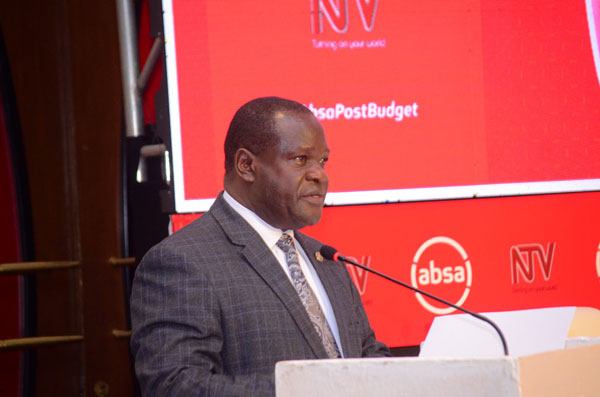
Experts hail budget decision not to levy any new taxes, urge focus on finding new markets
Kampala, Uganda | THE INDEPENDENT | The Deputy Secretary to the Treasury Patrick Ocailap has stated that the biggest cause of the rising commodity prices is external shocks, and attempts by Ugandan politicians to protest about it, will not change the situation.
He said focus by all Ugandans should be on production, especially food, as the country cannot influence the international prices of commodities like fuel. He said protests against high prices will instead raise them, as investors will shy away from an insecure country.
“The current strike against commodity prices is unnecessary. Let’s engage in agriculture and production. You cannot get food by protesting. Those striking should use that energy to go and dig cassava in the villages, and leave our youths in the centres to access emyooga and do business,” he said.

Ocailap argued that it would be ‘suicidal’ to try and use our foreign reserves to control prices affected by external factors that we have no control over. He said the reserves should be kept for other emergencies.
He was speaking at the Absa Uganda Post Budget Breakfast Dialogue held in Kampala today, that had panelists from the Uganda Manufacturing Association, Uganda Revenue Authority and NSSF share thoughts on how best to implement the 2022/2023 budget.
Minister Matia Kasaija on Wednesday read out a sh48 trillion budget with focus on “Full Monetisation of Uganda’s Economy through Commercial Agriculture, Industrialisation, Expanding and Broadening Services, Digital Transformation and Market Access.”
Ocailap stressed that agro- processing is very important and has been allocated sh1.449 trillion in the budget. He says this will support the Parish Development Model activities with a separate allocation of sh1.059 tn
All panelists hailed the budget for its clarity, and for taking the decision not to raise new taxes for the 2022/23 financial year, but urged greater focus on implementation of the Parish Development Model, and creating new markets for our agricultural products.
NSSF Deputy MD Patrick Oyota said as much as the budget stresses the importance of the Parish Development Model, with Ugandans being to encouraged to get into poultry and dairy farming, there is no practical suggestion on how to handle marketing of the products. He cited the recent problems the country has had with exporting milk and eggs to Kenya.
“The part we are failing as a nation is market access. The markets are inefficient. We need to take this fight to where the market is… Create a company to have the muscle to fight in the markets,” he said.
FULL VIDEO
Michael Segwaya, the Absa Uganda Chief Financial Officer and Executive Director outlined several measures the bank has taken to enable their customers adjust to the tough Post-Covid period.
He mentioned that the bank had restructured several loan repayments and said the dialogue is one of the bank’s efforts to ensure there is a conversation between customers and the bank. He mentioned value chain assistance the bank is offering, it role in the capital development of the country, and stated that about 80% of transactions in the bank are now online.
 The Independent Uganda: You get the Truth we Pay the Price
The Independent Uganda: You get the Truth we Pay the Price



